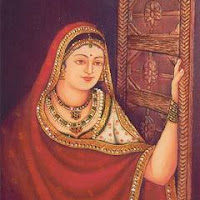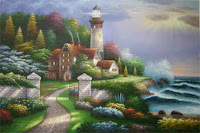 Descended from the Mathers, a family of famous clergymen in colonial Massachusetts, Mather Brown moved permanently to England in 1781 at the age of twenty. Under the tutelage of Benjamin West, he began oil painting biblical subjects and scenes from Shakespeare. The greater influence on Brown's portraits, though, was the fluid style of Gilbert Stuart. If anything, Brown was even more flamboyant than Stuart in his application of richly colored, thickly textured paint. In William Vans Murray, for instance, Brown outlined the sitter's eyelids in bright red. The hair, cravat, and curtain were rendered with pirouettes of a dancing brush.
Descended from the Mathers, a family of famous clergymen in colonial Massachusetts, Mather Brown moved permanently to England in 1781 at the age of twenty. Under the tutelage of Benjamin West, he began oil painting biblical subjects and scenes from Shakespeare. The greater influence on Brown's portraits, though, was the fluid style of Gilbert Stuart. If anything, Brown was even more flamboyant than Stuart in his application of richly colored, thickly textured paint. In William Vans Murray, for instance, Brown outlined the sitter's eyelids in bright red. The hair, cravat, and curtain were rendered with pirouettes of a dancing brush.Murray studied law in London from 1784 to 1787 before returning to his farm near Cambridge, Maryland, on the Chesapeake Bay's Eastern Shore. He later served in Congress and as minister to France. In addition to other prominent Americans abroad, such as Thomas Jefferson, Brown's clientele included members of the royal family.
This patronage sparked sarcasm from an exasperated, anonymous English painter: "Mr. West paints for the Court and Mr. Copley for the City. Thus the artists of America are fostered in England, and to complete the wonder, a third American, Mr. Brown of the humblest pretences, is chosen portrait painter to the Duke of York. So much for the Thirteen Stripes—so much for the Duke of York's taste."









No comments:
Post a Comment